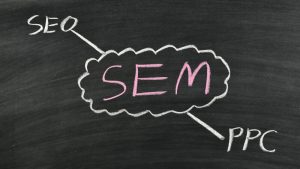
There are some stats that suggest having an ad on top of your organic search result will increase your click through rate and lower your cost per acquisition. While this stat does hold true, we’ve found that it is only worthwhile to do so in the following conditions:
1. A competitor is bidding on your brand. If your competitor’s ad is showing above your organic result, they are no doubt paying a premium cost per click to be there, but they are banking on stealing away a percentage of your customers. You can counteract this by bidding on your own brand.
2. You need to promote a specific page. The links shown below the main text ad, or result, are called a sitelink. In organic results, there is no way to tell Google which pages to include as a sitelink (you can however tell them to exclude a certain page after it appears). With a paid search ad, all aspects including sitelinks are able to be controlled. This is especially useful for e-commerce companies that are trying to drive traffic to their new product line or a flash clearance sale.
3. You have negative reviews or reports showing under your organic results. Even good companies can suffer from unfair negative online reviews. When this happens, placing a paid ad above your organic result can help push those negative results down the page.
4. You have distributors. This is especially true with consumer brands. The brand is often the first result, followed by the results of large distributors (Amazon, Macy’s, Target, REI, etc.) that sell the brand.
When to use paid search ads (PPC) vs. organic (SEO)
1. You need fast results. Think of the story about the tortoise and the hare. PPC is the hare, it gets you results fast. The time from launching an AdWords campaign until you start seeing ads can be as few as a couple of minutes. On the other hand, we have the tortoise A.K.A. organic search. It typically takes 3-6 months from the time of implementation to see any significant results in organic ranking. In the long run, organic results are considered more trustworthy (spoiler alert: the tortoise wins). In the case of sales and product launches, paid will always beat organic.
2. You want to appear in results when searchers are looking for your competitors. It is very difficult to optimize a webpage for organic ranking using your competitor’s name. However, you can bid on your competitor’s brand name in a paid search ad. Companies have to be careful to not use their competitor’s trademark within the ad copy, but it is allowed as a keyword.
3. You have a small marketing budget. Although paid advertising is very effective and drives revenue, it is a pay-to-play arena. If your marketing budget is only a few thousand a year, and you are not in a hurry, then you’re better off spending those funds on ongoing SEO.
How to work together:
At Anvil, we take an integrated approach to digital marketing. When a client first signs on and/or decides to engage us in additional services, our SEO and Paid Media (PPC) teams meet to discuss keyword strategy. We perform a Keyword Audit & Plan (affectionately call the KWAP). This document helps our teams discover which keywords the business is already ranking in the top three results for and which keywords will require help from PPC to get on the first page. Additionally, this document works in reverse by showing the two teams which keywords are out of budget for PPC and therefore need to be a focus of SEO and content creation. For example, in the marketing industry the key phrase “AdWords consultant” has a suggested bid of nearly $100 per click. For most agencies, this keyword is far too high to bid on, therefore it becomes a keyword that is used in blog posts, meta tags, website copy, and meta descriptions.
Cooperation doesn’t stop there. Our teams are in constant communication with each other. In fact, we arrange our office so that each member of our paid team is located only feet away from a member of the SEO team (this also comes in very handy for Nerf gun battles). As a client’s SEO efforts begin to gain traction, the SEO team notifies the PPC team so that these keywords can become less prominent in the AdWords campaigns. Should a keyword lose organic traction, the PPC team adds the keyword into a search campaign and the client’s site appears for that term within minutes.
As always, if you have questions or need help managing your SEO or paid media, don’t hesitate to contact us!
